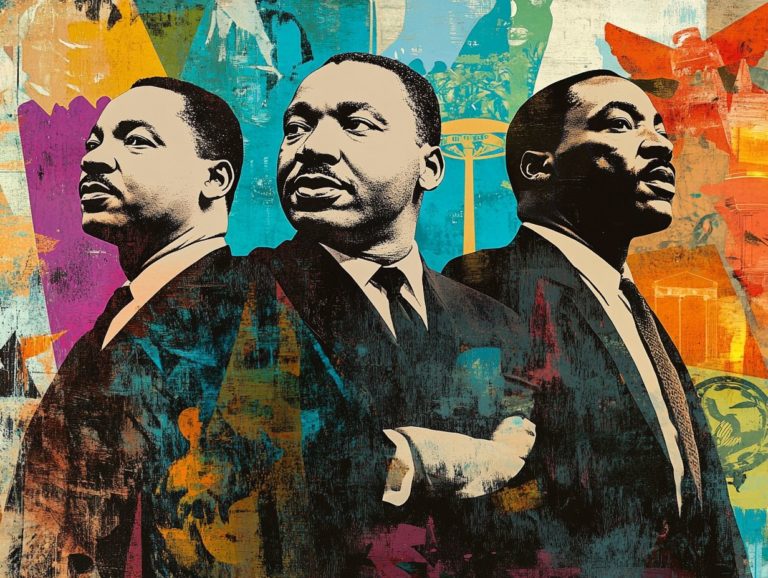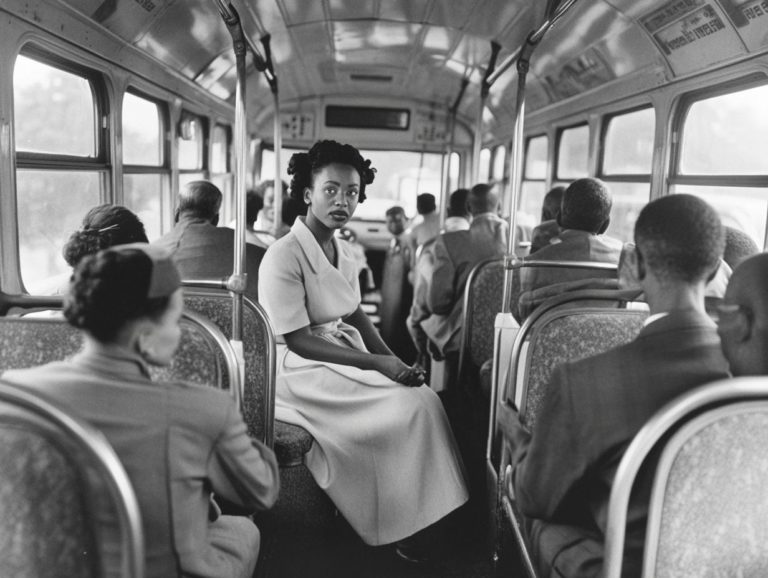The Remarkable Story of Ruth Bader Ginsburg
Ruth Bader Ginsburg had a modest childhood. She turned into a towering figure in the legal world.
With an unwavering dedication to justice and equality, she shattered barriers throughout her life. She paved the way for women’s rights and transformed the Supreme Court.
This exploration delves into her early life, academic achievements, and important legal career. It sheds light on the challenges she faced during her nomination.
Explore how her incredible legacy still inspires society and pop culture today.
Contents
- Key Takeaways:
- Early Life and Education
- Legal Career and Activism
- Nomination and Confirmation to the Supreme Court
- Legacy and Impact
- Frequently Asked Questions
- Who is Ruth Bader Ginsburg?
- Why is Ruth Bader Ginsburg s story so inspiring?
- What were some of Ruth Bader Ginsburg’s notable achievements?
- How did Ruth Bader Ginsburg’s personal life and background shape her career?
- What impact did Ruth Bader Ginsburg have on the Supreme Court and the legal system?
- How has Ruth Bader Ginsburg’s legacy continued after her passing?
Key Takeaways:
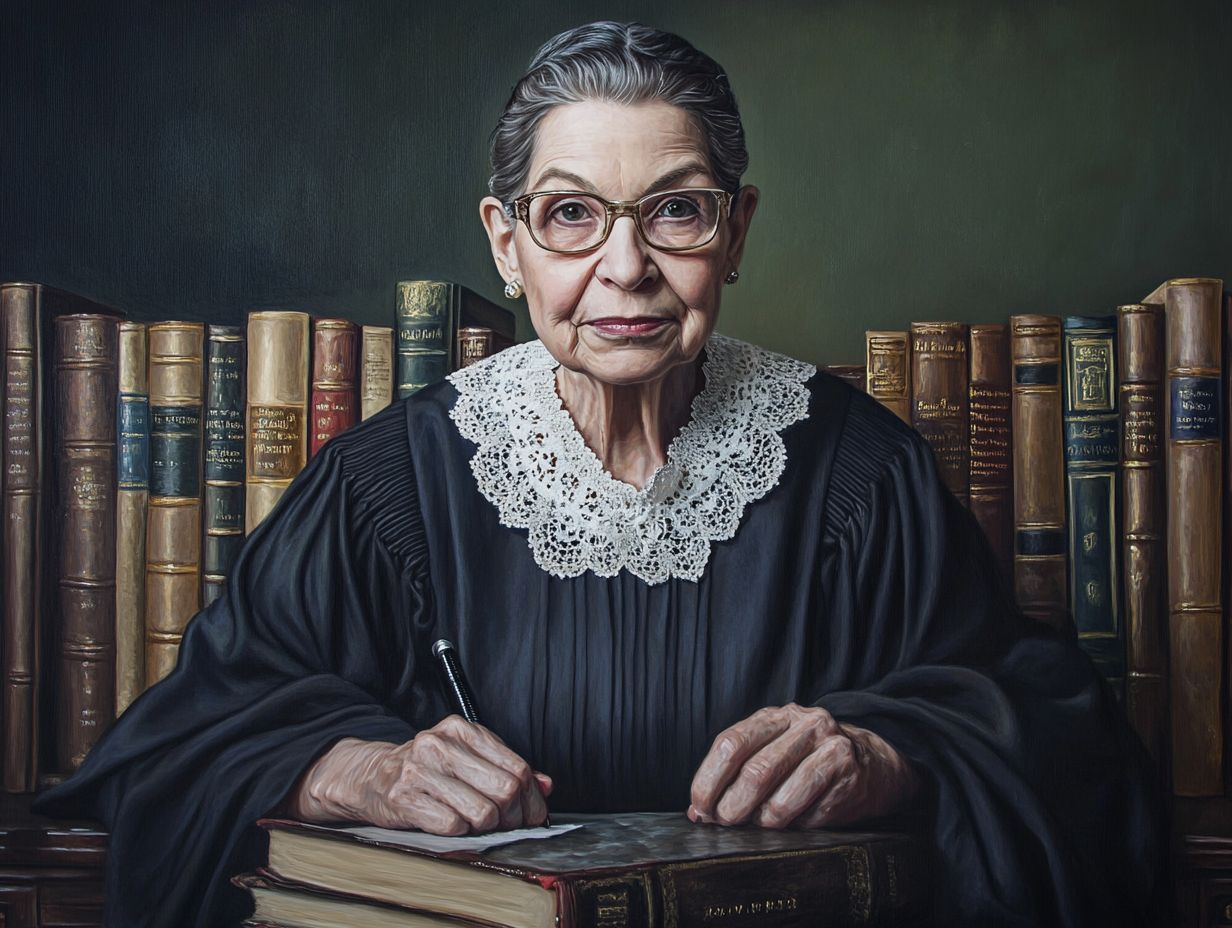
- Ruth Bader Ginsburg overcame childhood adversity and excelled academically, becoming a prominent legal figure in the United States.
- Her notable cases significantly impacted women s rights and equality.
- Despite controversies during her nomination, Ginsburg s legacy at the Supreme Court is unmatched.
Early Life and Education
Ruth Bader Ginsburg, a true trailblazer for women s rights and gender equality, was born in Brooklyn, New York. Her family instilled in her a profound appreciation for education and resilience.
After graduating from James Madison High School, she pursued her undergraduate degree at Cornell University. She then attended Harvard Law School before completing her studies at Columbia Law School.
At Columbia, she distinguished herself as a tenured professor and a visionary litigator, laying the groundwork for a career that would significantly impact the legal landscape.
Childhood and Family Background
Ruth Bader Ginsburg’s childhood in Brooklyn, New York, was shaped by a family that valued education and resilience. These values molded her into the feminist icon you recognize today.
Growing up in a Jewish household during an era of economic uncertainty, she faced societal and familial challenges. These experiences instilled in her a profound sense of justice. Her mother, a dedicated teacher, fostered a love for learning, while her father, navigating financial pressures, illustrated the importance of hard work and perseverance.
The socio-economic landscape of her neighborhood, along with discrimination faced by women and minorities, deeply influenced her worldview. These formative experiences ignited her passion for activism, laying a solid foundation for her unwavering commitment to equal rights and gender equality throughout her distinguished career.
Academic Achievements
Ruth Bader Ginsburg’s academic achievements are extraordinary. She excelled at Harvard Law School, facing gender discrimination with unwavering determination. Later, as a tenured professor at Columbia Law School, she became a beacon of inspiration for future generations of lawyers.
Throughout her educational journey, she confronted numerous obstacles that exposed the systemic biases in the legal field. Despite the pressures of a male-dominated environment, she persevered and forged a path for women in law. Her contributions to legal scholarship were profound; she published influential writings that addressed issues of equality and women s rights.
This solid academic foundation became the backbone of her passionate advocacy. For her, being a professor was not just about imparting knowledge; it was about cultivating a commitment to justice and equity among her students.
Legal Career and Activism
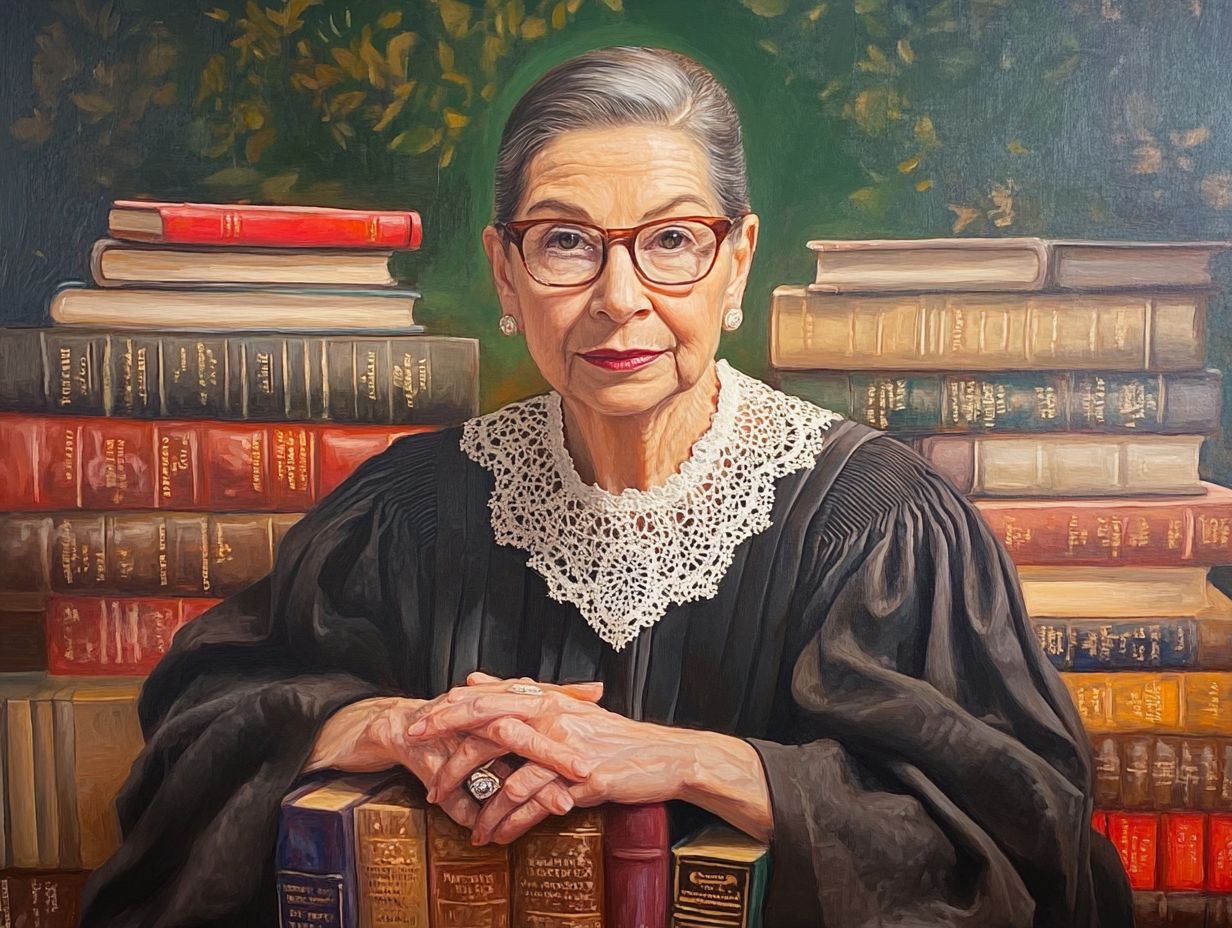
Ruth Bader Ginsburg’s legal career stands as a powerful testament to her unwavering commitment to social justice and gender equality. Her pivotal role in the ACLU’s Women s Rights Project showcases how she strategically challenged gender discrimination through landmark cases.
This extraordinary work earned her the moniker ‘Notorious RBG’ and left an indelible mark on American law, transforming the legal landscape for generations to come.
Ruth Bader Ginsburg s life is a testament to the power of resilience and dedication to justice.
Notable Cases and Legal Philosophy
As you explore Ruth Bader Ginsburg s career, you will encounter numerous landmark cases that shaped her legal approach and advanced gender discrimination and civil rights.
Her role in King v. Burwell highlights her belief in healthcare as a fundamental right. In Obergefell v. Hodges, her arguments helped secure marriage equality for same-sex couples, reflecting her commitment to each individual’s dignity.
Ginsburg’s legal reasoning reaches beyond the courtroom. She inspired a generation of activists and lawyers dedicated to fighting for gender equality. By dissecting laws that enable unfair treatment, she laid a foundation for a more equitable judicial landscape.
Impact on Women’s Rights
Ruth Bader Ginsburg dramatically changed women’s rights by boldly advocating for gender equality throughout her tenure in the U.S. Supreme Court.
Her fierce commitment reshaped societal views, showing that her fight was not just about legal principles but about elevating women’s status across various aspects of life.
Ginsburg’s key decisions often shed light on widespread unfairness, prompting essential re-evaluations of laws that perpetuated discrimination.
Through her landmark cases, she clarified that gender is a complex social construct deserving equal legal protection. Her unwavering spirit inspired many to advocate for justice, driving cultural shifts toward recognizing the importance of gender equality.
Nomination and Confirmation to the Supreme Court
Ruth Bader Ginsburg s nomination to the U.S. Supreme Court by President Bill Clinton in 1993 marked a landmark moment in judicial history. This event was characterized by a rigorous confirmation process that showcased both support and controversies surrounding her advocacy for women s rights.
Process and Controversies
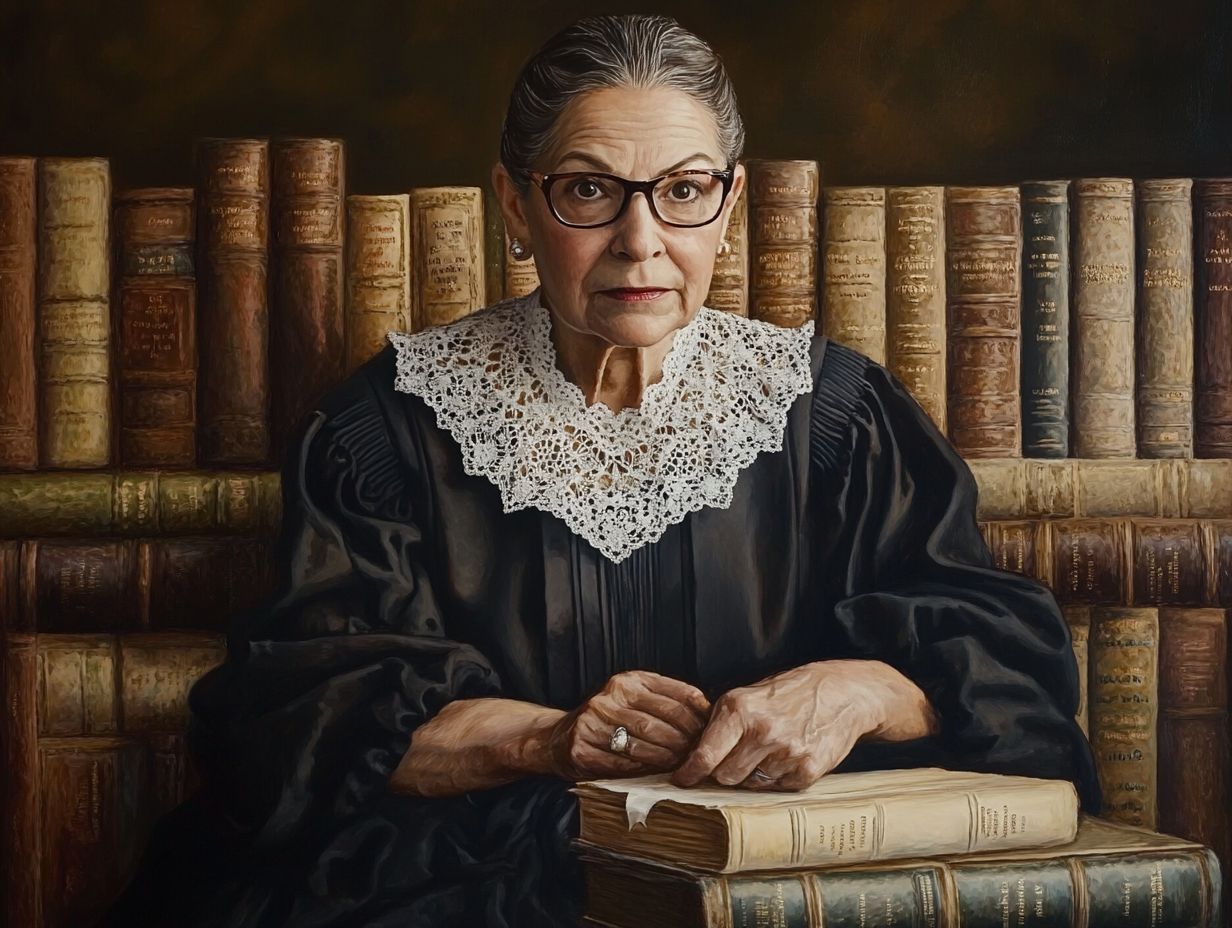
The nomination process for Ruth Bader Ginsburg was complicated, marked by controversies regarding her commitment to women’s rights and civil rights.
Critics voiced concerns about her approach to law, fearing it could lead to a broad interpretation of constitutional rights that might infringe on states’ rights. Conversely, advocacy groups rallied in her favor, highlighting her impressive history of championing gender equality and her belief in justice for all.
This debate surrounding Ginsburg’s confirmation reflected the larger societal struggles over gender equality. It underscored the clash of deeply rooted attitudes and values during a pivotal moment in American jurisprudence.
Legacy and Impact
The legacy of Ruth Bader Ginsburg is a testament to her profound influence on the U.S. Supreme Court and American society. Her judicial decisions and advocacy for social justice have established her as a pivotal figure in the ongoing struggle for equality.
Ginsburg’s contributions continue to inspire future generations to advocate for justice and equality, ensuring her influence is felt for years to come.
Influence on the Court and Society
Ruth Bader Ginsburg s influence on the U.S. Supreme Court stands out for her unwavering commitment to social justice and her remarkable ability to articulate disagreements in court that resonate with broader societal issues.
Her passionate arguments brought attention to critical matters like gender discrimination, reproductive rights, and the relentless pursuit of equality. These issues acted as essential catalysts for change. For example, in the landmark case of United States v. Virginia, the Court rejected the all-male admission policy at the Virginia Military Institute. In this case, Ginsburg’s legal reasoning set a strong standard for challenging widespread unfair treatment.
In her eloquent dissents, particularly in cases like Shelby County v. Holder, she emphasized the vital need to protect voting rights in an era increasingly marked by concerns over voter suppression. These significant rulings amplified Ginsburg’s profound impact on American jurisprudence and continue to inspire generations to champion justice and equality in an ever-diverse society.
Pop Culture and Personal Life
Ruth Bader Ginsburg transcended her role as a Supreme Court Justice to become a cultural icon, endearingly dubbed ‘Notorious RBG.’ This nickname reflects her remarkable influence and the public admiration she garnered over the years.
Her unique blend of intellect, determination, and humor resonates with people, cutting across generations and establishing her as a powerful symbol for various social movements, especially those advocating for gender equality and civil rights. Ginsburg’s appearances in documentaries, films, and even memes contributed to her iconic status. They showcased not only her significant legal achievements but also her spirited resilience.
Despite facing profound challenges in her private life, including health issues and the loss of loved ones, she continually emerged stronger. Her strength and vulnerability created a powerful connection with countless individuals, ensuring her legacy endures in both the courtroom and the cultural landscape.
Frequently Asked Questions
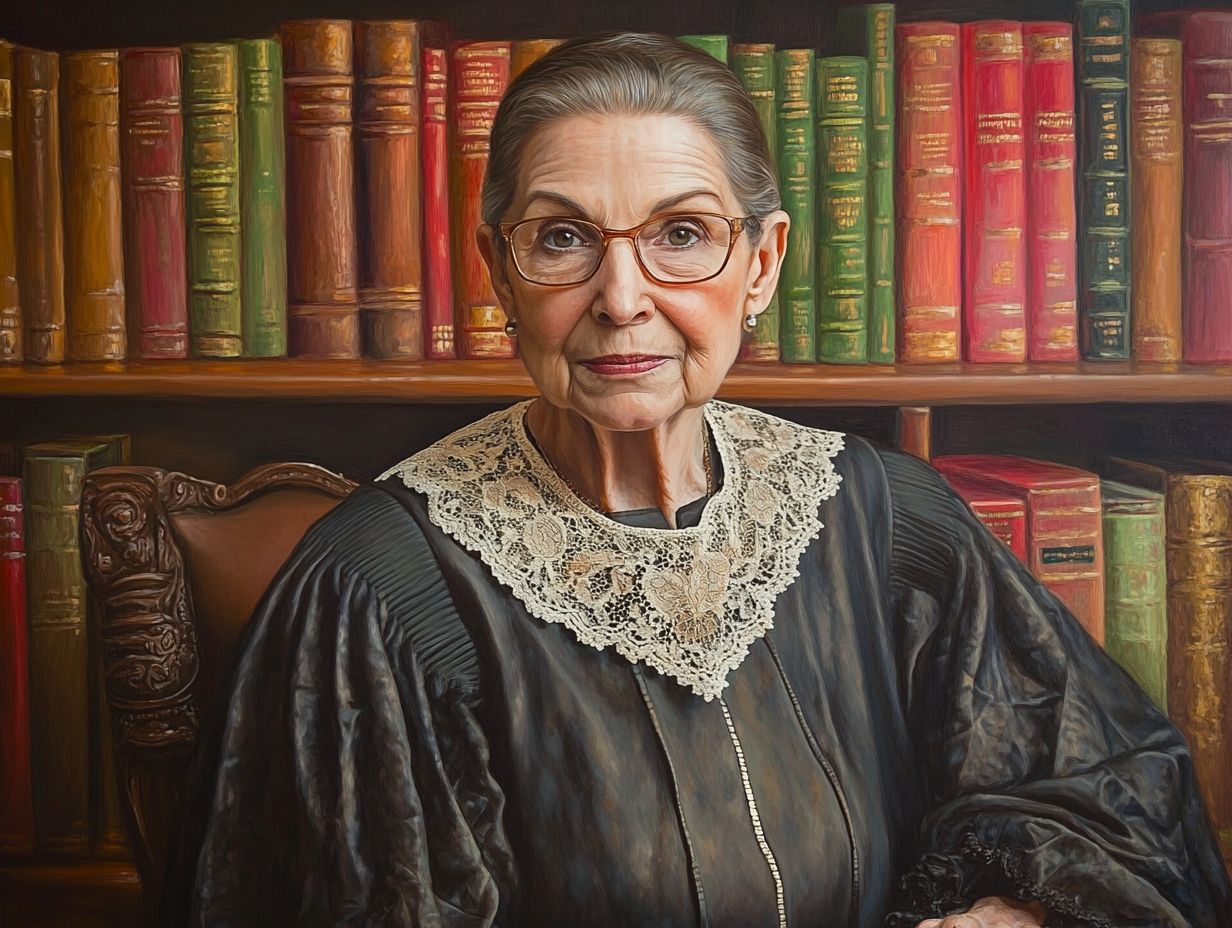
Who is Ruth Bader Ginsburg?
Ruth Bader Ginsburg was an American lawyer and jurist who served as an Associate Justice of the Supreme Court of the United States from 1993 until her death in 2020. She was the second woman to serve on the Supreme Court and became a cultural icon and pioneer for women’s rights.
Why is Ruth Bader Ginsburg s story so inspiring?
Ruth Bader Ginsburg’s story is remarkable because she faced numerous obstacles and discrimination as a woman in law. Yet she persevered and became one of the most influential and respected Justices in the history of the Supreme Court. She also battled cancer multiple times while serving on the Court, showing immense strength and dedication to her work.
What were some of Ruth Bader Ginsburg’s notable achievements?
Ruth Bader Ginsburg was known for her groundbreaking work in gender equality and women’s rights. She co-founded the Women’s Rights Project at the American Civil Liberties Union and argued several landmark cases before the Supreme Court, winning five out of six. She also wrote influential opinions on issues such as same-sex marriage and voting rights.
How did Ruth Bader Ginsburg’s personal life and background shape her career?
Ruth Bader Ginsburg was born and raised in a Jewish family in Brooklyn, New York. Her mother, a strong advocate for education, instilled in her a love for learning and a drive for success. Ginsburg was also deeply influenced by her husband, who supported her ambitions and played a significant role in her legal career.
What impact did Ruth Bader Ginsburg have on the Supreme Court and the legal system?
Ruth Bader Ginsburg’s impact on the Supreme Court and the legal system is immeasurable. She fought tirelessly for equal rights and paved the way for future generations of women in law. Her opinions and dissents have shaped important decisions on civil rights, gender equality, and other social issues.
Join the movement for equality and learn more about Ruth Bader Ginsburg s legacy!
How has Ruth Bader Ginsburg’s legacy continued after her passing?
Ruth Bader Ginsburg’s legacy continues to inspire and influence people around the world! She is a cultural icon and role model.
Her strong commitment, intelligence, and dedication to justice are truly inspiring. Her impact will live on through the laws and policies she helped shape and the generations of women she inspired.

